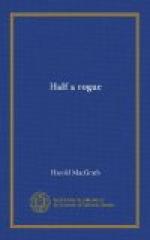They thundered over a wooden bridge. The spirit of the morning was in the horses; they began to race. An unexpected curve in the road discovered a road-builder and his gang of Italians. A low barrier ran across the road. It was not exactly needed, as they were not digging, but laying crushed stone. The obstruction was simply for the convenience of the boss, who desired to work unhampered.
“Shall we?” cried Warrington, mischief in his eyes.
“Yes.” There was no fear in this girl.
On they went, in a cloud of dust. The Italians made for the ditches, but the boss stood in the road and waved his arms in warning. Presently he, too, ducked.
Hep! and over the pair went, landing clean and sound on the other side of the barrier. Before the surprised boss could express himself, they were far down the road. A curse was hurled after them, but they heard it not. They hadn’t hurt the road at all, but the authority of the boss had suffered. He knew the girl, little snob! He would find out who the man was, soon enough. And if he had any influence in the City Hall, as he believed he had, he would make it tolerably warm for yonder vanishing parties.
He had put up that barrier to signify that the road was closed; very well, they’d see. Dirt under their feet, huh? All right. How he hated them all, with their horses and carriages and dances and dinners and clubs! Bah! He took a flask from his pocket and drank. Then he cursed the laggard Italians, and mourned that a year and a half must pass before he could sell their votes again. Bolles contracted for Italian labor and controlled something more than eight hundred votes. McQuade sublet various small contracts to him, and in return used the Italians during elections.
That jump, harmless enough in itself, was to prove a bad inspiration on Warrington’s part. But it is always these seemingly inconsequent things that bear the heaviest reckoning.
Half a mile onward they drew down to a walk, flushed and breathless.
“Perhaps we oughtn’t to have done that,” she said doubtfully, working the numbness from her fingers. “No thoroughfare” had hitherto been religiously respected by her; this was her first transgression, and she wasn’t entirely satisfied with herself.
“Pshaw! There’s no harm done. There was no earthly reason why we should have turned back to the fork and added two miles to our ride. Don’t let anything like that worry you; we went by too fast to be recognized. Look! here’s a big clover patch. I never pass clover without wanting to get down and hunt for four-leaves. Shall we?”
She was out of the saddle before the query had left his lips.
“I believe it would be a good idea to arm ourselves against bad luck,” she replied, gently moving aside the clover heads with her crop.
“You believe in four-leaf clover, then?”
She nodded.
“I do. I also am very careful,” he added, “to catch the money-patches on my coffee.”




